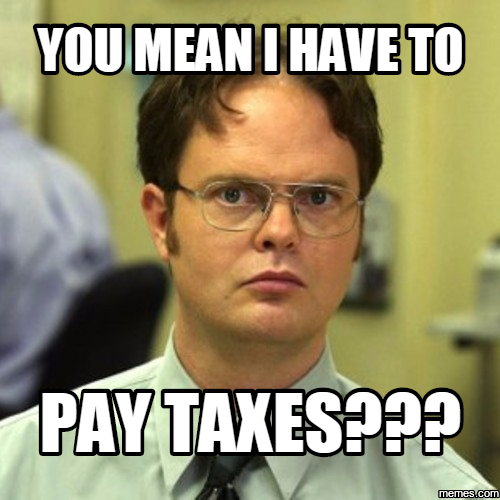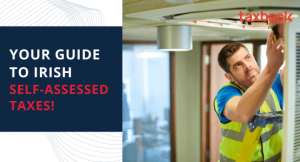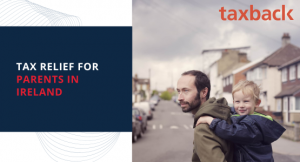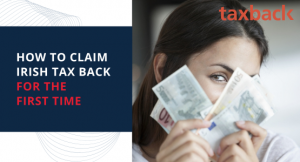Tax, Hashtags and Why Bloggers Should Look a Gift Horse in the Mouth

Blogging! Once the haven of creatives and those who felt compelled to write about the daily lives of their cats…has now become a bona fide business model. People are now making money from blogging about everything from food to fashion, and yes…their cats.
There are plenty of examples of Irish bloggers doing this. Leanne Woodfull started her blog Thunder & Threads in 2009 aged just 16 and is now paid by top brands like Tophsop and Boohoo to review products and advertise on her site. She often posts photos of herself wearing clothing and gets paid a commission.
Photographer Anouska Proetta Brandon, started her blog Anouska.net in 2011 and jets off expenses paid to places like to Tokyo and Monaco to share her pictures on social media, which is now her full-time job.
But where there is profit there is tax.
The question is, have you any idea how to go about being tax compliant as a blogger?

It’s hard to gauge exactly how many blogs are on the internet, but according to Worldmeters, over 2.5 million posts are written per day. A small portion of bloggers actually make any money from it, but if this is you, then unfortunately you’ll need to think about the tax part. With increasing pressure from the tax authorities, we wandered if bloggers ever considered their tax obligations?
It shouldn’t be a surprise to learn that someone blogging part-time and receiving the odd gift for a review doesn’t give it a second thought. But we put the feelers out and had a brief chat with a blogger to find out.
We had a quick chat with Jennifer Devitt of The life and style of Jen to find out her thoughts on the issue!

Jennifer Devitt-The life and Style of Jen
Q. Firstly tell me a bit about your blog
A. So I started my blog about 3 years ago after I left the retail industry but wanted to somehow keep beauty and fashion a part of my everyday life.
Q. Tell me about your background and why you got into blogging
A. My educational background is in business and accounting. I have a degree in business as well as an accounting technician diploma. I left retail about four years ago as I was ready to start my career in something related to my education.
Q. Do you ever do sponsored content or paid promotions?
A. I’m currently a brand ambassador for Bradley's Pharmacy which I receive payment for. I post pictures or write blog posts about products I have used from their shops or post about new products coming into their shops.
I get paid to promote the business in general, not review individual products. So some of the products I review I’ve paid for myself or I might promote that they are stocking a new brand of a product that I have already bought and used myself.
A. Do you know about the tax obligations when it comes to doing sponsored content/advertisements/paid promotions?
Q. I’m aware that I must inform the Revenue of the untaxed income I receive from paid promotions and advertising, and pay the necessary tax on this.
Q. Do you ever receive gifts from brands and if so describe?
A. I occasionally receive gifts from brands, perhaps one gift a month. In the past I received fake tan from a new Irish brand. When I receive a gift I’m under no obligation to review or discuss it on social media.
I also do collaborations where I’m offered a product or service in exchange for a mention on social media i.e. a salon may invite me to get a treatment in exchange for a post about it, I would not describe these as gifts as there are conditions attached.
Q. Do you know about the tax obligations when it comes to accepting/reviewing gifts?
A. I’m unaware of the tax obligations when it comes to accepting gifts or doing collaborations where no money has exchanged hands
Q. Do you think it would be helpful to have a guide for bloggers on their tax obligations and if so what format do you think would be most useful?
A. Yes I think a guide would be very useful as blogging is a very new business and many people may be unclear on what their obligations are on income received from this type of work. I think a Q&A format would be most useful and easy to read.
Q. And for the fun part, what are 3 things you could not live without?
A. Firstly, I definitely could not live without my phone, I rely on it for so much like online banking, social media, music and so much more.
An obvious one - but I could not live without my bank card. I rarely carry cash but am always spending! 😄
Travel - I love visiting different countries and cities! My next adventure is Croatia!
Thanks Jen!
So as we can see from this example, while some bloggers understand they have tax obligations when it comes to sponsored content or paid advertising, gifts may be seen as more of a grey area and could be clarified or explained better.
Earning income from blogging?
File your self-assessed tax return here
Let’s tackle the issues
Say you’re a blogger and everyone loves your blog…great! You regularly get free swag which you talk about on your blog. Even better! You might be a beauty blogger and review the latest ‘lipstick of the month’ or maybe you write about music and get free tickets to a concert.
But wait…did you think about the tax implications of receiving these gifts?
The boring part

Unfortunately the long arm of the taxman can have a claim on these ‘gifts’ that you’re sent. Once the value is above a certain threshold that is. If the value of the gifts (material items, or services) given by a single person/company is more than €3,000, then there is a tax implication and you must pay any tax due.
What you need to do
Any payment you receive for your blog is counted by Revenue as income and thus taxable. This includes payments for sponsored content, banner ads on your blog, and income from any seminars or workshops you may hold.
If the total amount you earn adds up to below €5000 in any given year, it’s pretty simple! You just contact Revenue or a tax agent like ourselves at Taxback.com who will adjust your PAYE return for you.
Earning income from blogging?
File your self-assessed tax return here
If you earn over €5000

If you earn over €5000 in total then you’ll need to register using a TRI Form, which is a tax registration form for sole traders. This registers you for income tax with Revenue. If your sales are over a certain threshold (€75,000 in 2017), then you’ll need to register for VAT on this form too.
As well as a completing a TR1 from you must file a self-assessed tax return each year stating the income earned. Declare everything! Any payment a blogger receives from operating a blog counts as income. The deadline for self-assessed tax returns in Ireland is October 31st so you must make sure you meet this, otherwise you could be subject to fines or penalties.
Taxback.com can help you file your tax return and iron out any other details you may be worried about to ensure you’re tax compliant. Our professional tax accountants can also check if you’re due any relief or expenses to reduce you overall tax liability.
Earning income from blogging?
File your self-assessed tax return here
Expenses

Self-assessed expenses can include items you need for you blogging business such as stationary, internet, travel to meetings, events. if you need to file a tax return, the team at Taxback.com can help you claim all expenses due. It can be difficult to know exactly what you can and can’t claim, which is why Taxback.com can check your circumstances and let you know exactly what you’re entitled to!
Earning income from blogging?
File your self-assessed tax return here
Why should you care?
You’re rolling in it; the free gifts, the money from your sponsored posts, lots of advertising. However there’s an increasing interest in the tax affairs of bloggers, with hashtags like #ad and #sp (sponsored post) popping up on social media posts virtually overnight. These hashtags make it clear when a post is affiliated with a brand.
So why this new focus on blogging income??

Because customers want to know if the content they’re reading is sponsored or contributed by a brand that directly influences the direction of the content. So for example, if your vitamin review is sponsored by the company that just happens to sell that product, it’s in the customer’s best interest to know! This has put increasing pressure on bloggers to implicitly state when they are being compensated for creating content.
The Competition and Consumer Protection Commission has started to monitor blogger and influencer channels to check for instances of product promotion in return for payment through products or “non-monetary benefits”.
Continuing to promote products or services without declaring the nature of the promotion or bothering to pay tax on the income from these promotions could be viewed as tantamount to tax evasion in some cases.
The Advertising Standards Authority of Ireland is keeping a watchful eye on developments and Revenue has also stated that ‘’confronting non-compliance in respect of online trading, blogging and digital influencing is a standard element of our compliance framework“.
Earning income from blogging?
File your self-assessed tax return here
According to the Advertising Standards Authority of Ireland, sponsored online content "must clearly state that the material is a marketing communication". The issue of transparency when it comes to endorsements isn’t going away anytime soon.
In fact, as the blogosphere continues to expand, income from blogging is only going to be further scrutinised by the relevant powers that be. The short story is, for the savvy blogger, being tax compliant is just smart business.
Still confused?

If you make money from your blog, then it’s a good idea to understand all your tax obligations.
You'll have less paperwork wth Taxback.com and you're guaranteed the maximum legal refund!

You can talk to our team at Taxback.com to save yourself a big headache with the taxman. Got a question? Ask below in the comments.




